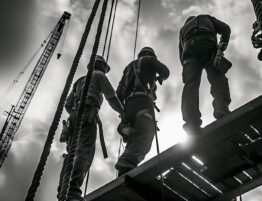
This week (10th – 16th June) is Men’s Health Week. Organised by the Men’s Health Forum, the week seeks to encourage all men to talk about and address any health concerns they may be experiencing.
When we think about health risks in construction, we usually consider things like physical injuries, musculoskeletal disorders or lung issues caused by exposure to dust and pollutants. But did you know that construction also has the largest burden of occupational cancer amongst the industrial sectors? Please read this week’s blog for some advice on what you can do to reduce the risks and/or catch cancer early.
What is Men’s Health Week?
Men’s Health Week is an annual awareness campaign held in the week leading up to Father’s Day. Originating in the United States in 1994, it has since spread to many other countries around the world. It’s aim is to bring attention to the health issues that specifically affect men and boys, and to encourage them to prioritise their health and wellbeing.
The week focuses on promoting preventative measures, early detection of health problems, and taking a proactive approach to healthcare. This is important because men tend to have poorer health outcomes than women and often avoid seeking medical attention. Men’s Health Week works to break down these barriers and empower men to take charge of their health.
Why is cancer awareness so important for men?
In the UK, every year, men account for around 199,000 new cancer cases and around 89,200 cancer deaths. Prostate, testicular, and colorectal cancers are the most common in men but it’s also worth noting what’s been happening specifically in the construction sector.
Construction accounts for over 40% of occupational cancer deaths and cancer registrations with the most significant causes being exposures to asbestos (70%), followed by silica (17%), then working as a painter and diesel engine exhaust (6-7% each).
Reducing the risk
As many as four out of ten cancers can be prevented by having a healthier lifestyle and avoiding risk factors. Here are some simple and practical steps that every man can take to reduce their cancer risk:
- Don’t smoke – cutting out cigarettes will dramatically cut your risk of cancer.
- Ensure your home and workplace is smoke free – second hand smoke increases the risk of lung cancer and heart disease for non-smokers.
- Watch your weight – an increase in body fat can lead to an increased risk of some cancers.
- Move more – sit less.
- Eat and drink healthily – include plenty of wholegrains, pulses, vegetables and fruits in your diet, and limit sugary or fatty foods / drinks (including alcohol), processed meat, salt and red meat.
- Avoid too much sun – use sun protection and always stay away from sunbeds.
- Be careful when working with chemicals and substances such as asbestos – always follow health and safety instructions and wear appropriate PPE.
- Participate in cancer screening programmes.
- Educate yourself about prostate health – The Men’s Health Forum have just launched a new manual ‘P For Prostate’ which looks at all aspects of the prostate – from where it is and what it does through to various problems it can cause for men. Order your free copy here.
- Know the signs of cancer, check for changes in your body and act quickly if you notice anything unusual – see more on this below.
Early detection saves lives
When cancer is detected early, survival rates improve. For example, nine out of every ten men survive prostate and testicular cancers when they are caught early. The problem, however, is that early detection doesn’t always happen – sometimes due to misinformation or lack of awareness but many times because a sense of embarrassment prevents men from seeking a medical examination.
The signs and symptoms associated with different forms of cancer are often also symptoms of other less serious issues. So, if you notice any of the following don’t panic but do get checked out by a GP:
- A new lump, bump or swelling anywhere on your body, or a sore that doesn’t heal (including inside your mouth).
- Skin changes, such as a new mole or changes in the colour, shape and size of existing moles.
- Unexplained bleeding and/or coughing-up blood (including traces of blood in pee or poo).
- Sudden weight loss which is not related to dieting.
- Constantly feeling tired, exhausted or worn out.
- A cough that lasts for more than three weeks or changes in your voice and feeling short of breath.
- Changes in your bowel or bladder habits, such as prolonged constipation, diarrhoea or problems passing urine.
- Difficulty swallowing, or persistent indigestion, heartburn or a feeling of being bloated.
- Pain that doesn’t go away.
If you notice a change, the chances are that it will not be cancer. However, getting it checked is never a waste of anyone’s time – and it could save your life. There’s also no need to be embarrassed about that ‘personal issue’ – your doctor will have been there, seen it and done it all before!
Keep this motto in mind – “IF IN DOUBT, CHECK IT OUT”.
11.06.2024
Feature image: Freepik
Information source: Information for this blog has been taken from several reputable sources including the Men’s Health Forum, Cancer Research UK and others.








